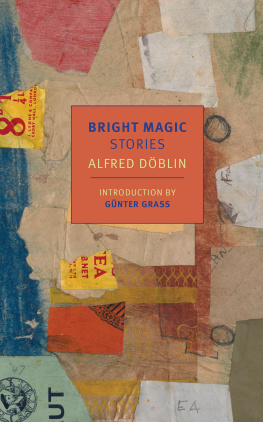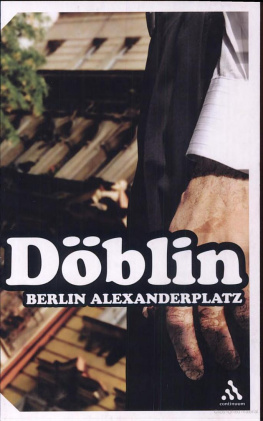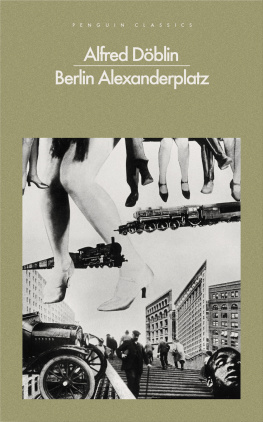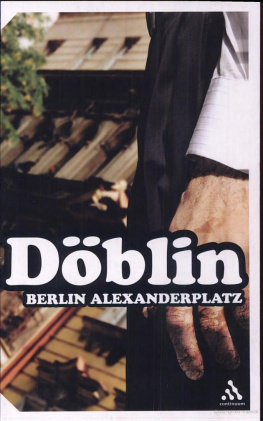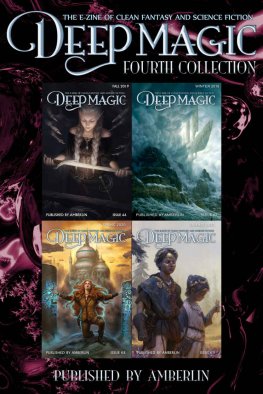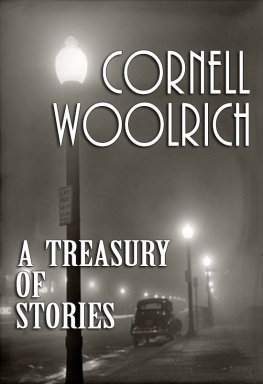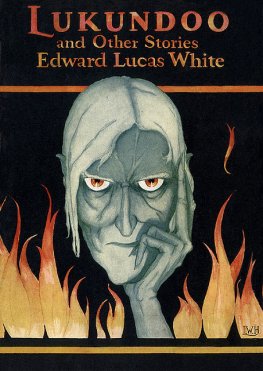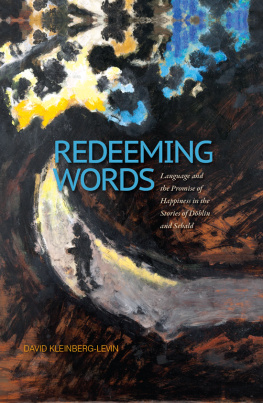BRIGHT MAGIC
Stories
ALFRED DBLIN
Selected and translated from the German by
DAMION SEARLS
Introduction by
GNTER GRASS
NEW YORK REVIEW BOOKS

New York
ALFRED DBLIN (18781957) was born in German Stettin (now the Polish city of Szczecin), to Jewish parents. When he was ten his father, a master tailor, eloped with a seamstress, abandoning the family. Subsequently his mother relocated the rest of the family to Berlin. Dblin studied medicine at Friedrich Wilhelm University, specializing in neurology and psychiatry. While working at a psychiatric clinic in Berlin, he became romantically entangled with two women: Friede Kunke, with whom he had a son, Bodo, in 1911, and Erna Reiss, to whom he had become engaged before learning of Kunkes pregnancy. He married Erna the next year, and they remained together for the rest of his life. His novel The Three Leaps of Wang Lun was published in 1915 while Dblin was serving as a military doctor; it went on to win the Fontane Prize. In 1920 he published Wallenstein, a novel set during the Thirty Years War that was an oblique comment on the First World War. He became president of the Association of German Writers in 1924, and published his best-known novel, Berlin Alexanderplatz, in 1929, achieving modest mainstream fame while solidifying his position at the center of an intellectual group that included Bertolt Brecht, Robert Musil, and Joseph Roth, among others. He fled Germany with his family soon after Hitlers rise, moving first to Zurich, then to Paris, and, after the Nazi invasion of France, to Los Angeles, where he converted to Catholicism and briefly worked as a screenwriter for Metro-Goldwyn-Mayer. After the war he returned to Germany and worked as an editor with the aim of rehabilitating literature that had been banned under Hitler, but he found himself at odds with conservative postwar cultural trends. He suffered from Parkinsons disease in later years and died in Emmendingen in 1957. Erna committed suicide two months after his death and was interred along with him.
DAMION SEARLS has translated books by Rilke, Proust, Hermann Hesse, Christa Wolf, and others. For NYRB he has edited Henry David Thoreaus The Journal and translated Nescio, Robert Walser, Friedrich Nietzsche, and Patrick Modiano.
GNTER GRASS (19272015) was born in the Free City of Danzig, to a German father and a Kashubian Polish mother. He published The Tin Drum in 1959 and soon became one of Germanys most prominent postwar intellectuals. Throughout his life he was an outspoken Social Democrat and critic of German reunification. He went on to publish numerous novels, including Crabwalk and two sequels to The Tin Drum: Cat and Mouse and Dog Years. In 1999, he was awarded the Nobel Prize in Literature. He died in Lbeck at the age of eighty-seven.
THIS IS A NEW YORK REVIEW BOOK
PUBLISHED BY THE NEW YORK REVIEW OF BOOKS
435 Hudson Street, New York, NY 10014
www.nyrb.com
Copyright 2016 by NYREV, Inc.
Original text copyright by S. Fischer Verlag GmbH, Frankfurt am Main
Translation copyright 2016 by Damion Searls
Introduction copyright Steidl Verlag, Goettingen, Germany 1997, 2002
All rights reserved.
All stories, except A Fairy Tale of Technology, published by S. Fischer Verlag GmbH, Frankfurt am Main, in Die Ermordung einer Butterblume: Gesammelte Erzhlungen. A Fairy Tale of Technology published by S. Fischer Verlag GmbH, Frankfurt am Main, in Schriften zu jdischen Fragen.
Gnter Grasss essay, My Teacher, Alfred Dblin was originally published as ber meinen Lehrer Dblin, Rede zum 10.Todestag Dblins am 26. 6. 1967 inBerlin in Akzente, 1967, S. 290309 and collected in Gnter Grass: Essays und Reden, Band I, 19551969(Werkausgabe in 18 Bnden, Band 14).
Cover image: Kurt Schwitters, Collage, 1947; bpk, Berlin/Sprengel Museum, Hannover, Germany/Michael Herling/Benedikt Werner/Aline Gwose/ Art Resource, NY
Cover design: Katy Homans
Library of Congress Cataloging-in-Publication Data
Names: Dblin, Alfred, 18781957, author. | Searls, Damion, translator.
Title: Bright magic : stories / by Alfred Dblin ; translated by Damion Searls ; foreword by Gnter Grass.
Description: New York : New York Review Books, 2016. | Series: NYRB Classics
Identifiers: LCCN 2015040622 (print) | LCCN 2015050009 (ebook) | ISBN 9781590179734 (paperback) | ISBN 9781590179741 (epub)
Subjects: | BISAC: FICTION / Short Stories (single author). | FICTION / Psychological. | FICTION / Literary.
Classification: LCC PT2607.O35 A2 2016 (print) | LCC PT2607.O35 (ebook) | DDC 833/.912dc23
LC record available at http://lccn.loc.gov/2015040622
ISBN 978-1-59017-974-1
v1.0
For a complete list of titles, visit www.nyrb.com or write to: Catalog Requests, NYRB, 435 Hudson Street, New York, NY 10014
CONTENTS
The Murder of a Buttercup (written 190411, published 1912)
Bright Magic (written 194045, published 1948)
THE SAILBOAT RIDE
T HE OSTEND dike lay in the flashing noonday sun. The men and women in their finery strolled past one another on the wide sea promenade, laughing. The windows of the beach houses sparkled affectionately up from under the reflections on the immeasurable water. The unceasing roar of the sea rolled away from the stone embankments, swelled back up again, swelled away again every time.
The heavy Brazilian walked with an open mouth among the men and women in their finery. He walked right next to the promenades sea railing. His head was bowed, as though standing under a shower; his full lips were moist. Black hair streaked with white hung over his ears. He inclined his head with its Panama hat to left and right, to meet the onslaught of the biting wind. He cast a happy glance now and then at the gray-green water. His yellow-brown, puffy face twitched; his eyes, sunk in gray caves, shimmered; he tried to follow the delicate eddies of air that ran around his bare neck, lifted the gray hair on his temples, and whirred against his cheeks with their fine stilettos. He was a little cold; he looked down along his white shirtfront, white sunshine flowing over it, and for a moment the thought that his gaze might be casting shadows made him nervous. He sighed and pushed his way deeper into the crowd of people.
He could still feel within him the shuddering of the railroad train that had brought him to the seaside from Paris the day before.
He had left Paris in great haste, sailed in great haste on his yacht from his homeland across the ocean, out of hopeless happiness, suddenly conscious of his forty-eighth year. In Paris he had endured the debaucheries of art for four monthsthe polished concert halls, the bestial dances; pneumonia laid him low; he was in the hospital for weeks, given up for lost. When he left the hospital one Sunday, knees weak, he tugged up the collar of his loden cape, climbed into an open carriage, and drove to the station. He spent a day slinking, doubled over, through Bruges, the dead city. Then he picked himself up and hurried to Ostend in the July heat.
He raised his gaze from the thin sand pulling away under his feet.
She glided past him a second timerust-colored hair beneath a broad-brimmed white hat. A gray gaze from an intelligent, no longer young face shrank back from him. She was perhaps in her mid-thirties. He could still hear a high melodious voice behind him.
Copetta turned around at the sound of this voice. Just then, the wind stopped slicing. She was talking to an old woman, supporting her arm. The Brazilian pushed back his hat; just as his gaze passed over her narrow shoulders, black shawl over dark blue silk, he lost her. The white hat bobbed over the crowd of people and disappeared around a corner.

